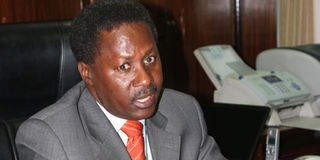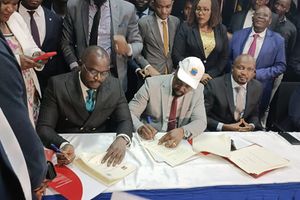Kenya exam boss rejects results audit calls

PHOTO/FILE
Mr Paul Wasanga, the chief executive of the exams council, which is under pressure to audit results of 2011 KCSE tests.
The Kenya National Examinations Council on Thursday rejected demands by members of Parliament for a forensic audit of last year’s Form Four exam.
The demands follow the cancellation of examination results, particularly in North Eastern, and complaints of leaks, unusual grading of some subjects and what appeared to be inaccuracies in mean scores for some schools.
But while the council’s chief executive Paul Wasanga said all was well, independent investigations by the Nation show that an internal, high-level inquiry into alleged result leaks is under way.
The investigating team, made up of Teachers Service Commission boss Gabriel Lengoiboni, Kenya Institute of Education director Lydia Nzomo and director of quality assurance Enos Oyaya, among others, has held several several sessions which Mr Wasanga has not attended.
“Forensic audit would mean that we provide raw scripts. We can’t do that. It’s not acceptable,” Mr Wasanga, told the Nation by telephone.
He advised those with complaints to seek redress in the courts. “I don’t understand the reason for a forensic audit when the candidates clearly cheated. They have been told exactly why their results were cancelled.”
He also dismissed the widespread belief that exam results for some schools leaked long before they were released by Education minister Sam Ongeri on February 29.
In Parliament, MPs wanted an audit to establish if the cancellations were legitimate.
This came after the MP for Dujis, Mr Adan Duale, tabled a petition by 1,600 students from Wajir, Garissa and Mandera counties, whose results were cancelled.
He claimed that there were major anomalies in the marking and grading of candidates, rendering the whole process imperfect, and hence the need for independent investigations.
He cited as an anomaly a case where a candidate who died two months before the exam was given a grade “y”. “He was ranked as having scored a ‘y’,” said Mr Duale. (READ: Dead student had been graded)
The MP added that another student who did not write the exam, having quit school five months before, was awarded D+ grade.
Mr Wasanga cautioned against politicising examinations, saying it could undermine their credibility. Those protecting exam cheats were promoting impunity and should be resisted, he said.
Independent investigations by the Nation have established that the council is carrying out internal investigations over possible leakage of results.
Results leakage, a new phenomenon, is where schools know their results before they are officially released.
At least 15 Knec staff members have been questioned to establish if they could have given out the results of the Kenya Certificate of Secondary Education (KCSE) exam before they were released by Prof Ongeri.
Our investigation established that the special team of chief executives of education agencies and the Education ministry, has been interrogating staff members since Monday. The team is sitting at Knec’s headquarters in Nairobi.
But when asked about the investigations, Mr Wasanga described it as an internal process to check if reports being made about results leakage were true.
“Since people have been talking about some schools having received their results before the official announcement by the minister, we have to examine if there could be any truth,” he said.
“What’s going on is simply an internal process check-up. It’s a normal administrative exercise that should not be misinterpreted.”
Indications that the council would be the target of an investigation came when Prof Ongeri, as he released the results, said officials at Knec could be linked to the annual examination leakage.
“There are crucial leads that we are following; some officers may have been involved in one way or another (in the cheating),” he said.
“I want leads to these leakages followed for stern action.” Prof Ongeri instructed Education permanent secretary James ole Kiyiapi, Education secretary George Godia and Mr Wasanga to investigate the issue.
Some 2,927 candidates in 154 examination centres had their results cancelled over irregularities. (READ: 2,900 denied results over cheating)
More than 1,000 of them were from North Eastern region, an issue that sparked riots in Garissa town last week.
Speaking in Parliament last week, Prof Ongeri said 35 officers, including teachers, had been given letters asking them to show why they should not be punished over the irregularities.
“They will receive a letter to show cause why they should not face disciplinary action for being involved in the examination malpractices.”
The investigating team wants the Knec staff to explain the embarrassing situation in which the KCSE results were leaked to dozens of schools before they were released.
Because of the leaks, some schools ended up receiving the results two weeks before they were released. (READ: Report lifts lid on KCSE exam cheats)
Schools in the Western, Nyanza and Eastern regions in particular, are said to have got their results early.
Upon realising the anomalies, Mr Wasanga wrote to suspected staff about what he called “unauthorised disclosure of sensitive information”.
Examination results, he said, were supposed to remain confidential until they were announced by the Education minister.
He wrote: “Reliable reports reaching my office, however, indicate that during the processing of the 2011 KCSE results, you conducted yourself in a suspicious manner that led your colleagues to suspect that you were providing information to unauthorised persons outside the council.”
The letter accused the suspects of breaching examination security arrangements.
“You are required to show cause why serious disciplinary action should not be taken against you for disclosing security information on examination results,” wrote Mr Wasanga.
“You are also encouraged to provide any confidential information on how any disclosure of information related to examination results could have occurred.”
Affected employees, described as lower in rank and unlikely to have accessed the information without express authority from the top, were to respond to the accusations against them by noon on March 8, 2012.
It is not clear if the taskforce would also be the one looking at the likely anomalies that occurred in Home Science and Art and Design.
The performance of the subjects drastically fell in the 2011 KCSE leading to many complaints by schools and parents.
The performance in Home Science came down from a mean of 54.8 per cent in 2010 to 45.9 last year. That of Art and Design dropped to 54.7 per cent from 59.4 per cent in 2010.
The Nation established that the council was responding to a select group of schools promising to look into their queries over the poor results.
In a response to one of the well performing schools, senior deputy secretary Eddah Muiruri, writing on behalf of Mr Wasanga, said a team had been formed to look at the institution’s Home Science and Art and Design results.
Earlier, responding to readers’ comments in the Saturday Nation, Mr Wasanga denied there was a problem with the Home Science paper. (READ: Knec boss takes your queries on KCSE)
We are greatly concerned over the Home Science results as our students have never recorded such low marks,” said the readers who included a Home Science teacher of Githunguri High School, S. Kariuki.
“We are therefore appealing to you to re-assess the marks awarded to the students.”
But Mr Wasanga said the national mean for Home Science was generally very low in 2011. The overall performance was thus generally poor compared with the last three years.
He said Knec undertakes a thorough validation of results before they are released to ensure that the results are as accurate as possible.
The principal of Nguviu Girls High School, Ms R. W. Wahome, told Nation she doubted the authenticity of the results and called on the council to revisit the matter.




